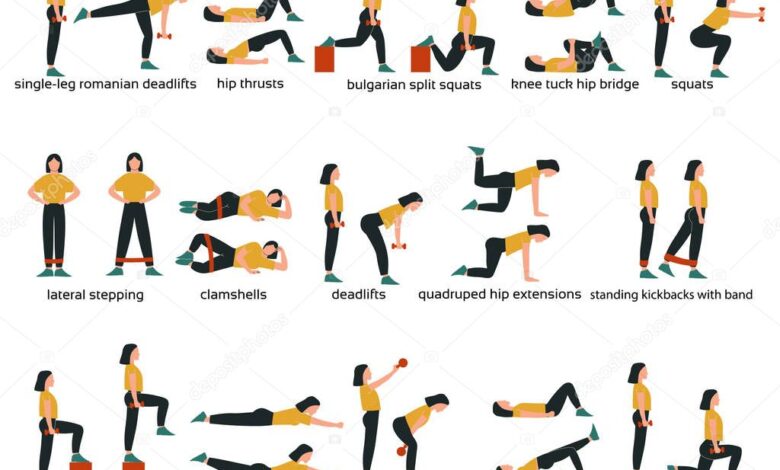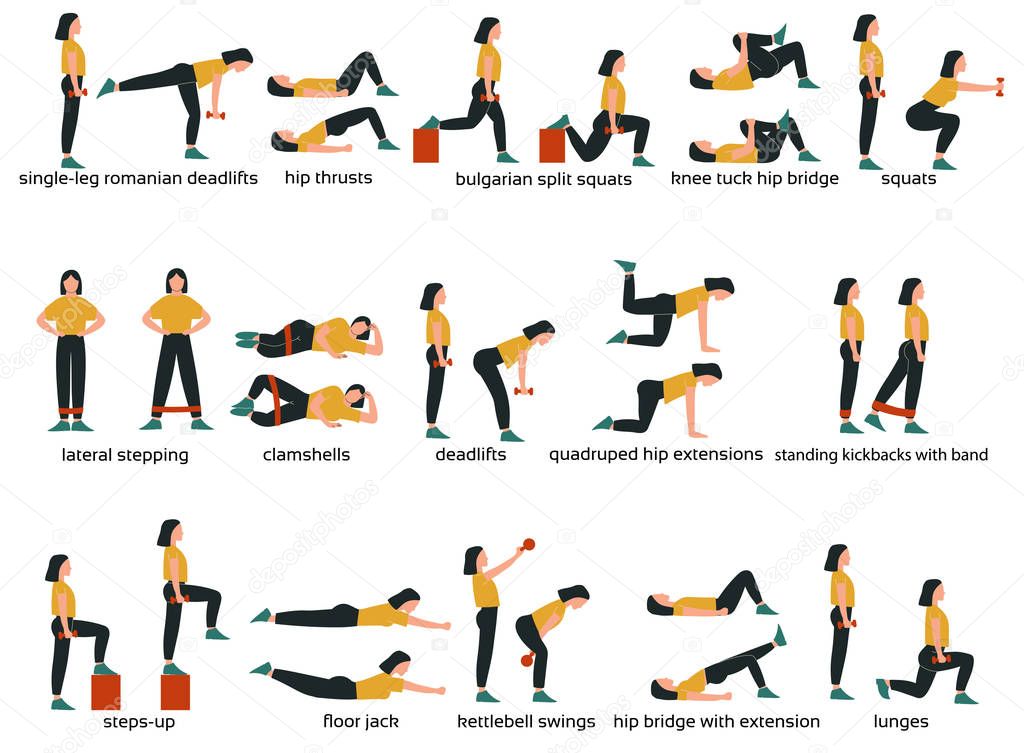
5 Best Moves for Stronger Glutes
5 Best Moves for Stronger Glutes – You know that feeling of wanting to have a strong, sculpted backside? Well, you’re not alone. Strong glutes are not just about aesthetics; they’re crucial for overall fitness, athletic performance, and injury prevention.
Think about it: your glutes are the largest muscle group in your body, and they play a vital role in everything from walking and running to lifting and jumping. They also help stabilize your hips and spine, which is essential for good posture and balance.
So, if you’re looking to build a stronger, more functional body, you need to focus on your glutes. Let’s dive into five of the best exercises that will target your glutes and help you achieve your fitness goals.
These exercises will work your glutes from different angles, ensuring that you’re hitting all the major muscle fibers. From hip thrusts to Bulgarian split squats, we’ll explore a variety of moves that are both effective and safe. Ready to get started?
Let’s get those glutes firing!
The 5 Best Moves for Stronger Glutes
Strong glutes are essential for a variety of activities, from everyday movements to athletic performance. They play a crucial role in hip extension, hip abduction, and external rotation, which are fundamental for walking, running, jumping, and lifting. Developing strong glutes can improve your posture, reduce the risk of injuries, and enhance your overall athleticism.
Working on those glutes? Don’t forget to fuel your body with healthy and delicious food! Check out 5 classic Chinese recipes 500 calories make home for some inspiration. Once you’ve got the energy, you’ll be ready to tackle those squats, lunges, and hip thrusts!
Here are five of the best exercises for targeting and strengthening your glutes.
Hip Thrusts
Hip thrusts are a highly effective exercise for building strong glutes. They target the gluteus maximus, the largest muscle in your body, and also engage the hamstrings and core. The proper form for hip thrusts involves lying on your back with your feet flat on the floor, hip-width apart.
Place a barbell across your hips, resting on your upper thighs. With your core engaged, push through your heels to lift your hips off the floor until your body forms a straight line from your shoulders to your knees. Slowly lower your hips back to the starting position.
Here are some variations of hip thrusts:
- Barbell hip thrustsare the most common variation and offer a challenging load.
- Band-assisted hip thrustscan be used to increase resistance and enhance glute activation.
- Single-leg hip thruststarget each leg individually, improving balance and stability.
To maximize glute activation during hip thrusts:
- Focus on squeezing your glutes at the top of the movement.
- Keep your core engaged throughout the exercise.
- Avoid arching your back excessively.
Glute Bridges
Glute bridges are a versatile exercise that can be performed with or without weights. They target the gluteus maximus, hamstrings, and core muscles.The proper form for glute bridges involves lying on your back with your knees bent and your feet flat on the floor, hip-width apart.
Building a strong booty takes dedication, and that includes fueling your body with nutritious meals. After crushing those glute workouts, why not treat yourself to a delicious and healthy meal like this 250 calorie chicken cauliflower fried rice recipe ?
It’s packed with protein and veggies, helping you recover and stay energized for your next glute-building session.
Lift your hips off the floor until your body forms a straight line from your shoulders to your knees. Hold for a few seconds and then slowly lower your hips back to the starting position.Here are some variations of glute bridges:
- Single-leg glute bridgeschallenge your balance and stability.
- Band-assisted glute bridgesincrease resistance and enhance glute activation.
- Elevated glute bridgesincrease the range of motion and challenge your glutes further.
To maximize glute activation during glute bridges:
- Focus on squeezing your glutes at the top of the movement.
- Keep your core engaged throughout the exercise.
- Avoid arching your back excessively.
Bulgarian Split Squats
Bulgarian split squats are a challenging exercise that targets the glutes, quads, and hamstrings. They also improve balance and stability.The proper form for Bulgarian split squats involves placing one foot on a bench or elevated surface behind you. With your other foot flat on the floor in front of you, lower your body until your front knee is bent at a 90-degree angle.
Push through your front heel to return to the starting position.The benefits of Bulgarian split squats include:
- Building strength and hypertrophy in the glutes, quads, and hamstrings.
- Improving balance and stability.
- Increasing flexibility and range of motion.
To maximize glute activation during Bulgarian split squats:
- Focus on squeezing your glutes at the top of the movement.
- Keep your core engaged throughout the exercise.
- Avoid letting your front knee go past your toes.
Deadlifts
Deadlifts are a compound exercise that engages multiple muscle groups, including the glutes, hamstrings, back, and core. They are a highly effective exercise for building overall strength and power.The proper form for deadlifts involves standing with your feet hip-width apart, toes slightly pointed out.
Bend at your knees and hips, keeping your back straight and your core engaged. Grip the barbell with an overhand grip, slightly wider than shoulder-width apart. Lift the barbell off the ground by extending your hips and knees simultaneously. Lower the barbell back to the floor in a controlled manner.Here are some variations of deadlifts:
- Conventional deadliftsare the most common variation and target the glutes, hamstrings, and back.
- Sumo deadliftsuse a wider stance and target the glutes and inner thighs more effectively.
- Romanian deadliftsfocus on hamstring and glute development and emphasize hip hinge movement.
To maximize glute activation during deadlifts:
- Focus on driving your hips forward at the top of the movement.
- Keep your back straight and your core engaged throughout the exercise.
- Avoid rounding your back or lifting with your lower back.
Glute Kickbacks
Glute kickbacks are an isolation exercise that targets the gluteus maximus. They can be performed with a variety of equipment, including cables, bands, and bodyweight.The proper form for glute kickbacks involves kneeling on the floor with your hands on the ground.
I’m all about finding ways to make my workouts more effective, and that includes targeting my glutes. I’ve been experimenting with the 5 best moves for stronger glutes, and I’m seeing great results! Of course, fueling my body with healthy and delicious food is key, and that’s where this vegan super greens tomatillo posole recipe comes in.
It’s packed with nutrients and keeps me energized for my next glute-building session!
Keeping your back straight and your core engaged, extend one leg behind you, squeezing your glutes at the top of the movement. Slowly lower your leg back to the starting position.Here are some variations of glute kickbacks:
- Cable glute kickbacksprovide resistance from a cable machine.
- Band-assisted glute kickbacksuse resistance bands to enhance glute activation.
- Single-leg glute kickbackstarget each leg individually, improving balance and stability.
To maximize glute activation during glute kickbacks:
- Focus on squeezing your glutes at the top of the movement.
- Keep your core engaged throughout the exercise.
- Avoid arching your back excessively.
Conclusion
Building strong glutes is not just about aesthetics, it’s about improving overall strength, stability, and athletic performance. By incorporating these five effective exercises into your routine, you can target your glutes effectively and achieve noticeable results.
Key Takeaways
The five exercises discussed in this article provide a comprehensive approach to glute strengthening. They target different aspects of glute activation and engagement, ensuring a well-rounded workout. Remember, consistency is key. Regular practice of these exercises will lead to significant improvements in your glute strength and overall fitness.
Seeking Professional Guidance, 5 best moves for stronger glutes
While these exercises are effective, it’s always advisable to consult a certified fitness professional for personalized advice. They can assess your current fitness level, tailor a workout plan specific to your needs and goals, and guide you through proper form and technique to prevent injuries.
Concluding Remarks: 5 Best Moves For Stronger Glutes

By incorporating these five moves into your workout routine, you’ll be well on your way to stronger, more sculpted glutes. Remember, consistency is key! Focus on proper form, progressive overload, and listen to your body. Don’t hesitate to seek guidance from a certified fitness professional for personalized advice.
So, get ready to feel the burn and watch your glutes transform!

